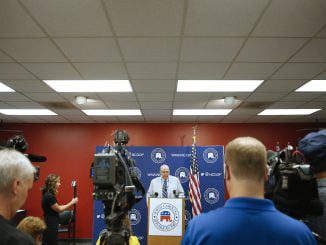
RALEIGH — The education workgroup of the North Carolina House Select Committee on COVID-19 heard from technology, education and health officials on topics including the reopening of schools, as well as school connectivity and continuing food service issues.
The committee heard from Jeff Sural, director of the Broadband Infrastructure Office at the state’s Department of Information Technology about school connectivity issues and “homework gap” concerns. The homework gap is when students are assigned homework requiring access to the internet but don’t have home access.
In January of this year, Sural testified before U.S. House of Representatives Committee on Energy and Commerce Subcommittee on Communications and Technology at a digital inclusion hearing. North Carolina was the only state requested to testify at that hearing.
According to the maps provided by Sural, which uses data from the Federal Communications Commission, counties considered to have a “homework gap” map are consistent with those that are underserved. Numbers in Graham, Swain and Northampton Counties were significant, with 50% or more of students in those areas having no broadband access.
While lack of broadband access is still high in some counties, particularly rural areas, North Carolina continues to lead in expanding internet access. Sural said during his presentation that that North Carolina is the only state with an existing effort to close the “homework gap.”
Sural’s report to the education workgroup cited a survey in which 67% of respondents named cost as the reason for having no internet access. In North Carolina, around 76% of households have broadband access but only 60% of them meet 25/3 mbps broadband speed standard.
Suggestions made by Sural included creating a grant program housed in North Carolina Broadband Infrastructure Office, along with the adoption of policies and programs that increase the “availability, adoption, and use of broadband.” He said his office will continue to study the “homework gap.”
Updates on School Nutrition concerns related to COVID-19 were given by Dr. Lynn Harvey, School Nutrition Services Section chief, Department of Public Instruction.
“Under the epidemic, the reliance upon meals provided by schools is greater than ever,” said Harvey.
Harvey said that buses have become a big part of food delivery to students and that funding will be needed to keep those deliveries going. She said 18 million meals have been served since March 15, either through 1,000 pickup sites or via 2,100 school buses being used for meal drop-offs.
Harvey indicated that food costs will likely increase during the upcoming summer months and that shortages could become a factor.
“There have been challenges in the food supply because we abruptly switched from a cafeteria style menu,” said Harvey.
The final item on the agenda dealt with logistical and health issues associated with the possible reopening of schools for the upcoming school year.
Chief deputy secretary of Department of Health and Human Services Susan G. Perry, along with DPI’s deputy superintendent of district support, Dr. Beverly Emory, and deputy superintendent of innovation, Dr. David Stegall, presented five areas of focus for reopening schools: social distancing, cleaning/hygiene, monitoring health of students and staff, protecting high-risk populations, and educating students and staff.
According to the presentation, NCDHHS will be “vetting preliminary health guidance options with education leaders for school reopening areas under review” in the five focus areas.
It was suggested that structural and physical space modifications be made in schools, including adding marked waiting areas with six-foot distancing. Another suggestion was to reconfigure desks so children are seated six feet apart.
Given that many districts across the state have a number of schools that are already well over capacity, questions remain on how or if they will be able to accommodate and maintain this kind of social distancing.
A series of actions to limit the number of people in a public school were also suggested, such as staggering school hours or alternating days or weeks when students attend class on campus.
Presenters said that actions to reduce “sustained exposure” should be employed in every aspect of the school’s operations from limiting group activities like clubs and sports, to eating lunch in the classroom instead of the cafeteria. In the same vein, recess should be staggered as well, and arrival and dismissal processes should be altered to reduce contact.
“There’s a lot more work that needs to be done, because while we have some good ideas from the public health side,” said Perry. “The implications for schools, we realize, are massive.”
There was no discussion on the safety of veteran teachers or staff who are over the age of 50 who could be at increased risk for exposure to COVID-19.
During the question and answer period, Rep. Hugh Blackwell (R-Burke) mentioned the low occurrence of COVID-19 in children and asked if NCDHHS was considering reopening schools in varying degrees instead of a one-size-fits-all approach. Perry responded that asymptomatic spread of COVID-19 by children was possible.
The safety of very young children attending pre-K or kindergarten, who may be at risk from Kawasaki Disease or Pediatric Inflammatory Multiorgan Syndrome, was not specifically addressed. At least 102 children in New York state have reportedly developed these conditions, which typically strikes children 5 years old and younger. Three children have died from the conditions there as of mid-May.
According to Perry, NCDHHS has “very high sense of urgency” about providing clarity about just when schools will reopen. When asked about a specific timeline, Perry said, “That’s the million-dollar question.”



